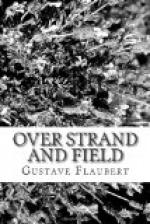In the middle, an open ossuary contains skeletons that have been exhumed in order to make room for other corpses. Who has said: “Life is a hostelry, and the grave is our home?” But these corpses do not remain in their graves, for they are only tenants and are ejected at the expiration of the lease. Around this charnel-house, where the heaps of bones resemble a mass of fagots, is arranged, breast-high, a series of little black boxes, six inches square, surmounted by a cross and cut out in the shape of a heart in front, so that one can see the skulls inside. Above the heart-shaped opening are the following words in painted letters: “This is the head of —— ——, deceased on such and such a day, in such and such a year.” These heads belonged to persons of a certain standing, and one would be considered an ungrateful son if, after seven years, he did not give his parents’ skulls the luxury of one of these little black boxes. The remainder of the bodies is thrown into the bone-house, and twenty-five years afterwards the heads are sent to join them. A few years ago they tried to abolish the custom; but a riot ensued and the practice continued.
Perhaps it is wicked to play with those round skulls which once contained a mind, with those empty circles in which passion throbbed. Those boxes surrounding the ossuary and scattered over the graves, over the wall and in the grass, without any attempt at order, may appear horrible to a few and ridiculous to many; but those black cases rotting even as the bones blanch and crumble to dust; those skulls, with noses eaten away and foreheads streaked by the slimy trails of snails, and hollow, staring eyes; those thigh-bones piled up as in the great charnel-houses mentioned in the Bible; those pieces of skulls lying around filled with earth, in which a flower springs up sometimes and grows through the holes of the eyes; even the vulgarity of those inscriptions, which are as similar as the corpses they identify—all this human rottenness appeared beautiful to us, and procured us a splendid sight.
If the post of Auray had arrived, we should have started at once for Belle-Isle; but they were waiting for it. Transient sailors with bare arms and open shirts sat in the kitchen of the inn, drinking to pass away the time.
“At what time is the post due here in Auray?”
“That depends; usually at ten o’clock,” replied the innkeeper.
“No, at eleven,” put in a man.
“At twelve,” said M. de Rohan.
“At one.”
“At half-past one.”
“Sometimes it doesn’t reach here until two o’clock.”
“It isn’t very regular!”
We were aware of that; it was already three. We could not start before the arrival of this ill-fated messenger, which brings Belle-Isle the despatches from terra firma, so we had to resign ourselves. Once in a while some one would get up, go to the door, look out, come back, and start up again. Oh! he will not come to-day.—He must have stopped on the way.—Let’s go home.—No, let’s wait for him.—If, however, you are tired of waiting gentlemen.... After all, there may not be any letters.... No, just wait a little longer.—Oh! here he comes!—But it was some one else, and the dialogue would begin all over again.




